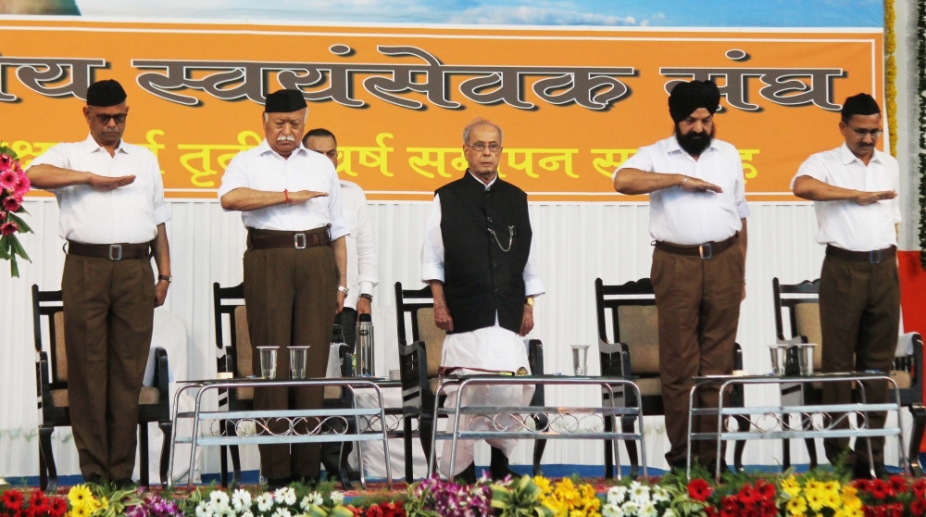Cong’s show of admiration for Ambedkar nothing but drama: BJP
The BJP on Monday accused the Congress of invoking Bharat Ratna Bhimrao Ambedkar's legacy for its political purposes.
On 7 June, former president Pranab Mukherjee preached lessons in tolerance, nationalism, patriotism and diversity to karyakartas of the Rashtriya Swayamsevak Sangh (RSS) at their Nagpur-based headquarters.

Former President Pranab Mukherjee and RSS chief Mohan Bhagwat at the concluding function of RSS-organised "Tritiya Varsh Varg" in Nagpur on June 7, 2018. (Photo: IANS)
On 7 June, former President Pranab Mukherjee preached lessons in tolerance, nationalism, patriotism and diversity to karyakartas of the Rashtriya Swayamsevak Sangh (RSS) at the latter’s Nagpur-based headquarters.
The highly-anticipated event was closely watched by political parties of all hues and subscribers of diverse ideologies for the ironic presence of a statesman who remained a staunch Congress loyalist throughout his political career in the camp of an organisation he was critical of in an anachronistic period.
Advertisement
Many in the Congress had objected to Mukherjee’s acceptance of the RSS invite even before he delivered the speech, which was full of references to India’s glorious heritage and the nation-building exercise undertaken by leaders such as Jawaharlal Nehru and Sardar Vallabhbhai Patel.
Advertisement
Post the speech, the Congress officially claimed that Mukherjee had “shown the mirror of truth to the RSS”. And though many in the Congress changed their views over the former President’s presence in the RSS camp, it appears Congress leader Manish Tiwari is not convinced.
In a series of tweets, Tiwari – a senior Congress leader and former Union minister – questioned the former President’s purpose and compared his visit to the misplaced conviction of Neville Chamberlain in the Munich Agreement.
“@CitiznMukherjee May I ask you a question that you still have not answered that is bothering millions of Secularists&Pluralists. Why did you choose go to the RSS headquarters & deliver homilies on Nationalism? Your generation cautioned mine in training camp after training camp thru 80’s &90’s about the intent & designs of RSS,” wrote Tiwari.
“You were a part of the Govt that banned RSS in 1975 & then again in 1992. Don’t you think you should tell us what was evil about RSS then that has become virtuous now? Either what we were told then was wrong,” he wrote, adding, “or your lending respectability if not legitimacy to RSS by the act of association is not kosher given your stature in Public life.”
“Was it an attempt at ideological rapprochement/lowering bitterness in political firmament/positioning as cynics suggest. Whatever the motivation was it will be seen as just an attempt to mainstream RSS in secular and pluralistic consciousness,” Tiwari warned.
“History tells us when Nazi’s were strutting around Europe in black berets Chamberlain thru Munich Pact- 1938 thought he had bought the ‘Peace of our Times’. What a false dawn it was,” he concluded referring to the 1938 Munich Agreement.
2/2 thru 80’s &90’s about the intent & designs of https://t.co/LfXXRNck0b were a part of the Govt that banned RSS in 1975 & then again in 1992. Don’t you think you should tell us what was evil about RSS then that has become virtuous now? Either what we were told then was wrong2/2
— Manish Tewari (@ManishTewari) June 8, 2018
4/4 was it will be seen as just an attempt to mainstream RSS in secular&pluralistic consciousness.History tells us when Nazi’s were strutting around Europe in black berets Chamberlain thru Munich Pact- 1938 thought he had bought the ‘Peace of our Times’.What a false dawn it was😢
— Manish Tewari (@ManishTewari) June 8, 2018
The Munich Agreement was signed between Nazi Germany and major European powers following the annexation of parts of Czechoslovakia by Adolf Hitler. Following the signing of the agreement on 30 September 1938, the then Prime Minister of the United Kingdom Neville Chamberlain delivered a speech in which he claimed to have returned from Germany with “Peace for our time”. Chamberlain’s belief was shattered within a year of the declaration when Germany’s aggressive moves started World War II.
At a press conference held in New Delhi, Congress leader Randeep Surjewala said, “Mukherjee reminded the present Narendra Modi government of following ‘Rajdharma’ founded upon our diversity, non-violence, multi-culturalism and assimilation of ideas. He reminded RSS as also Prime Minister Narendra Modi that ‘Indian nationalism is Constitutional patriotism’.”
In the presence of RSS chief Mohan Bhagwat and top functionaries of the ideological parent of the BJP, Mukherjee traced India’s history from the ancient to the modern and how all of the various events influence India’s national character.
“Our national identity has emerged after a long drawn process of confluence and assimilation, the multiple cultures and faiths make us special and tolerant,” he said after highlighting the glory of the Mauryas, the Guptas and the “conquest of Delhi by Muslim invaders” and the takeover of the nation by a “mercantile company”.
Praising Jawaharlal Nehru, Mukherjee said the nationalism of the first Prime Minister of India was not bound by religion or language. In the same breath, he also praised the nation-unifying task undertaken by Sardar Vallabhbhai Patel following India’s freedom in 1947.
Quoting from Nehru’s book ‘Discovery of India’, Mukherjee said, “I am convinced that nationalism can only come out of the ideological fusion of Hindu, Muslims, Sikhs and other groups in India.”
Read More: Pranab Mukherjee gives a lesson in tolerance, secularism, nationalism to RSS swayamsevaks
“As Gandhi ji explained, Indian nationalism was not exclusive nor aggressive nor destructive,” the former President said.
“Any attempt at defining our nationhood in terms of dogma and identities or religion, region, hatred and intolerance will only lead to dilution of our identity,” he warned at the gathering attended by the entire top brass of the RSS, the ideological parent of the ruling Bharatiya Janata Party (BJP).
“For us, democracy is not a gift but a sacred trust,” said Mukherjee, who had earlier praised RSS founder KB Hedgewar as “a great son of Mother India”.
Advertisement